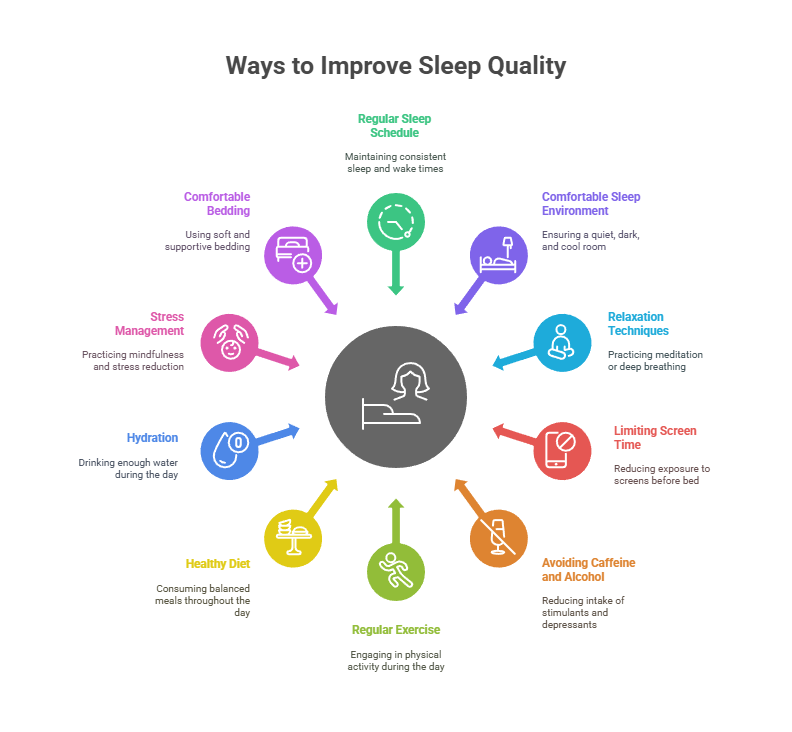Sleep isn’t a luxury—it’s a necessity. Without it, your mind becomes foggy, your mood drops, and even your physical health starts to suffer. Yet millions of people struggle to get quality sleep each night. The good news? You don’t need sleeping pills or expensive gadgets.
Simple lifestyle changes can make a big difference. Whether you’re struggling to fall asleep or waking up too often, these 10 best ways to improve sleep will help you rest better and wake up feeling refreshed. Its very simple and practical tips you can try to improve your sleep quality and time.

10 Best Ways to Improve Sleep
In this article, we will discuss, one by one, how we can improve our sleep quality and duration and how we can use these simple tips and tricks for a better daily life. After improving our sleep quality, we can enhance our health and mood because sleep has a direct connection to our overall well-being. If we get enough quality, we can increase our productivity and feel energetic and fulfilled. So are you ready to improve your quality of life and apply these techniques for better sleep?
- Make sure you get enough sleep—the first and best way to improve sleep
For better sleep, go to bed and wake up at the same time daily. Indeed, maintaining a consistent routine extends to weekends. The circadian rhythm is your body’s internal clock, and it likes things to stay the same. Your body gets confused when you keep moving your bedtime around. This situation makes it difficult to fall asleep and stay asleep. Melatonin is the hormone that makes you sleepy. Having a regular schedule can help keep it in check. Don’t give in to the urge to sleep in late, even if you’re worn out. Slowly, your body will start to feel sleepy on its own at the same time every night.Important points:
Every night, try to get 7–9 hours of sleep.
On the weekends, don’t sleep in too late.
Set alarms to wake you up and to go to sleep.
2. Set up a relaxing routine for going to bed—the second-best way to rove sleep
Your brain knows it’s time to wind down when you have a calm bedtime routine. If you check your email, watch a crime thriller, or do housework, you can’t expect your body to fall asleep right away. Before bed, give yourself at least 30 to 60 minutes of peace and quiet. This technique helps your body go from being active to being at rest. You could read, take a warm bath, listen to music that makes you feel better, or do some light stretching. Stay away from things that will make you feel or think a lot. Your body will eventually associate these habits with sleep, making it easier to fall asleep alone.
Important points:
Read, think, or take a hot bath.
Stay away from the news, arguments, and mentally heavy tasks.
Every night, do the same things.
3. Don’t use screens too much before bed – the third best way to improve sleep
Your phone could be keeping you up at night. Melatonin is the hormone that makes you sleepy. Screens emit blue light, which blocks melatonin. Your brain will think it’s still daytime after this. Using your phone or watching TV right before bed can keep you up at night and make your sleep less good. At least an hour before bed, try to stay away from screens. Use night mode or blue light-blocking glasses if you must use your phone. Do something else instead, like read a book, stretch, or write in a journal. It will be beneficial for your eyes and brain.
Important points:
Avoid using any screens. One hour before bed
Blue light filters, or “night mode,”, can help.
Do things without a screen, like reading or writing in a journal.
4. Be careful about what you eat and drink-Fourth best way to improve sleep
What you eat or drink in the evening can have a big effect on how well you sleep. If you drink coffee or tea, it can keep you awake until late at night. Alcohol may make you drowsy at first, but it can also wake you up several times. If you eat something heavy or spicy right before bed, it could make your stomach hurt. Replace your meal with a small snack if you’re hungry. You could have almonds, bananas, or warm milk. Furthermore, don’t drink too much water at night to cut down on trips to the toilet.
Important points:
After evening, don’t drink coffee or tea
Late at night, don’t eat big meals.
Try a light snack that will help you sleep.
5. Make your bedroom a relaxing place to sleep – the fifth best way to improve sleep
Your surroundings have a lot to do with how well you sleep. Some things in a room can make it difficult to fall asleep or stay asleep. Try to make your bedroom a peaceful place to sleep. Make sure the room is quiet, dark, and cool. Set the comfortable temperature in the room and use blackout curtains. Buy a quality mattress and pillows that will help your body. Take away any electronic distractions. Your body knows it’s safe to relax in a clean, quiet place.
Important points:
Keep the room dark and cool.
Use soft bedding and curtains that block out light.
Keep noise and screen distractions to a minimum.
6. Be physically active every day – Sixth best way to improve sleep
Getting some exercise during the day can help you sleep better at night. Regular exercise lowers stress, boosts mood, and helps keep your sleep-wake cycle in check. It doesn’t have to be long to make a difference. But don’t exercise too close to bedtime, as it can wake you up and delay sleep. It’s best to work out in the morning or early evening. Discover something you like, like gardening, dancing, yoga, or riding a bike. Your consistency is more important than your intensity.
Important points:
Regular exercise is best done before bed.
You could go walking, do yoga, or swim.
Do not do intense workouts late at night.
7. Deal with stress and worry – Seventh way to improve sleep
Stress and sleep don’t go together. When you want to sleep, your mind can be racing with thoughts of the next day, money issues, or personal issues. Getting better at dealing with stress can help you feel better. Writing in a journal, doing breathing exercises, or meditating can really help. You can ease your mind by listing the things you need to do tomorrow. Do not try to sleep against your will. Instead, try to calm down and let yourself fall asleep on your own. If you can’t stop thinking, say a word that makes you feel better or put on some soft music.
Important points:
Write down what’s on your mind.
Do some deep breathing or meditation.
Use the Headspace or Calm apps.
8. Don’t take long naps during the day – eight is the best way to improve sleep
A short nap can give you more energy, but a long nap or one late in the day can keep you from sleeping at night. If you often need long naps, it means you’re not getting enough sleep at night. Never nap after 3 p.m. and only take 20–30 minute naps. That way, when it’s time for bed, your body will still feel worn out. People who have trouble sleeping should avoid naps and focus on getting enough sleep at night. The goal is to make you feel sleepy during the day so that you naturally fall asleep at night.
Important points:
Take a short nap (less than 30 minutes) only if you need to.
Do not take naps after 3 PM.
If you have trouble sleeping, don’t take naps.
9. Spend time in natural light – the ninth best way to improve sleep
The sun helps your body’s clock stay in sync. It makes more serotonin during the day, which at night changes into melatonin to help you sleep. Every morning, try to spend at least 30 minutes outside. You can sit by a window, go for a walk, or drink your coffee outside. When it gets dark, turn down the lights and stay away from bright artificial lighting. This slow change can tell your brain it’s time to rest. You will produce less melatonin at night if you receive sunlight during the day.
Important points:
Every day, spend 20 to 30 minutes outside.
Let the morning sun enter your house.
At night, spend less time in artificial light.
10. Stick with it and be patient – Tenth way to improve sleep
It takes time to get better sleep. If your sleep doesn’t get better in a day or two, don’t give up. Don’t break your new routines for at least two to four weeks. Write down when you went to bed, when you woke up, how you felt, and any problems that happened during the night in a sleep journal. Enjoy small wins like getting to sleep faster, waking up less often, or having more energy. Your body will adjust faster if you stick to the same habits. Please keep in mind that getting enough sleep is beneficial for you in the long run.
Important points:
Record how you sleep.
Allow time for changes to take effect.
Keep trying and being patient.

FAQs: How to Naturally Get Better Sleep
1. How many hours of sleep should I get every day?
Most adults need between 7 and 9 hours of sleep each night. Depending on age, health, and level of activity, some people may need a little more or a little less.
2. What should I stay away from before bed?
Stay away from screens, coffee, heavy meals, and alcohol. All of these make it harder for you to fall asleep on your own.
3. Does music make you feel better?
Yes, white noise or music that calms you down can help you relax and block out sounds, which can make it easier to fall asleep.
4. What if these tips don’t help?
If you’ve tried all of these ideas and are still having trouble sleeping, you might want to see a doctor. If you can’t sleep, you might have a sleep disorder like sleep apnoea or insomnia.
In short, here's what you need to know about sleeping smarter.
It’s not magic to get enough sleep; it’s a habit. And it takes time and consistency, just like any other habit. Start small if you want to sleep better. Pick one or two tips to start with. You could turn off your phone an hour earlier or go for a short walk in the morning.
Gradually build upon what you have already accomplished. Everything changes when you sleep, including your weight, mood, and memory. You can live a healthier, happier life by putting rest first. You deserve a good night’s sleep that makes you feel better.
If you’ve tried everything and still can’t fall asleep, don’t be afraid to talk to a doctor You can get help for sleep disorders.
In this article, I have attempted to present tips and tricks in a basic manner and included a link for further reading. If you are interested in more detailed information, you can read it. You can comment with sleep quality tips and share them with loved ones if they’re helpful.
